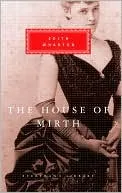 I've never read Edith Wharton. Not even that bane of high school English students, Ethan Frome. I saw and admired Martin Scorsese's version of The Age of Innocence, but that's about the extent of my Whartonizing. So I took down the old volume of The House of Mirth that's been yellowing on my shelves lo these many years. (Don't know where or when I got it. Maybe in graduate school, when I figured I needed to read something by her.)
I've never read Edith Wharton. Not even that bane of high school English students, Ethan Frome. I saw and admired Martin Scorsese's version of The Age of Innocence, but that's about the extent of my Whartonizing. So I took down the old volume of The House of Mirth that's been yellowing on my shelves lo these many years. (Don't know where or when I got it. Maybe in graduate school, when I figured I needed to read something by her.) Lately, I've been "doing" American lit. Twain, as you know, if you've been following these posts. And before that Henry James's The American -- one of those early James novels that true Jamesians regard almost as juvenilia. (I've never been much of a Jamesian. I foundered in my attempt to get through The Wings of the Dove.)
One reason for my current immersion in Am Lit is my lately heightened awareness of the ongoing oddness of America's relationship with the rest of the world, as well as the current squealing on the right about the loss of "the America I knew," as some of the participants in the town halls have put it. No profound insights into that as yet.